Everything to Know About Scalp Psoriasis Management
Scalp psoriasis is a challenging skin condition that affects millions of people, causing discomfort, itching, and visible skin changes on the scalp. This chronic autoimmune disorder can significantly impact daily life, leading many individuals to seek effective management strategies. Understanding the condition, its triggers, and treatment options is crucial for those experiencing scalp psoriasis.

What Exactly is Scalp Psoriasis?
Scalp psoriasis is an inflammatory skin condition characterized by red, scaly patches that can appear as small spots or cover larger areas of the scalp. These patches often result from an overactive immune system that speeds up skin cell production, causing rapid buildup and visible scaling. The condition can range from mild, with slight scaling, to severe, with thick, crusted plaques that may cause significant discomfort and self-consciousness.
What Are the Common Symptoms to Watch For?
Typical symptoms include intense itching, silvery-white scales, red patches, and potential hair loss in affected areas. Some individuals may experience burning sensations or soreness on the scalp. The severity can vary widely between individuals, with some experiencing minor irritation while others face more extensive skin coverage and related complications.
How Can You Manage Scalp Psoriasis at Home?
Home remedies can provide significant relief for scalp psoriasis symptoms. Gentle scalp care is essential, including using soft-bristled brushes, avoiding harsh chemical treatments, and maintaining proper hygiene. Natural approaches like tea tree oil, aloe vera, and coconut oil can help soothe irritation and reduce inflammation. Stress management techniques such as meditation and regular exercise can also help minimize flare-ups.
What Lifestyle Changes Can Help Control Symptoms?
Dietary modifications can play a crucial role in managing scalp psoriasis. An anti-inflammatory diet rich in omega-3 fatty acids, fruits, vegetables, and lean proteins may help reduce symptoms. Avoiding triggers like alcohol, smoking, and excessive stress is important. Maintaining a healthy weight and getting adequate sleep can also support overall skin health and potentially reduce psoriasis flare-ups.
Understanding Treatment Options in the United States
Treatment approaches vary depending on individual cases. Dermatologists typically recommend personalized treatment plans that may include topical treatments, light therapy, and lifestyle interventions. Some patients find success with specialized scalp treatments that focus on reducing inflammation and promoting skin healing. Professional consultation is crucial for developing an effective management strategy.
Provider and Treatment Comparison
| Treatment Approach | Provider Type | Estimated Cost Range | Effectiveness Rating |
|---|---|---|---|
| Topical Treatments | Dermatology Clinics | $50 - $300 per visit | Moderate to High |
| Light Therapy | Specialized Skin Centers | $100 - $500 per session | High |
| Holistic Approaches | Integrative Health Clinics | $75 - $250 per consultation | Moderate |
Prices, rates, or cost estimates mentioned in this article are based on the latest available information but may change over time. Independent research is advised before making financial decisions.
When Should You Visit a Doctor?
Consulting a healthcare professional is recommended if symptoms persist, spread, or significantly impact daily life. Signs that indicate immediate medical attention include intense pain, signs of infection, widespread scaling, or psychological distress related to the condition. A dermatologist can provide comprehensive evaluation and develop a targeted treatment plan.
This article is for informational purposes only and should not be considered medical advice. Please consult a qualified healthcare professional for personalized guidance and treatment.




